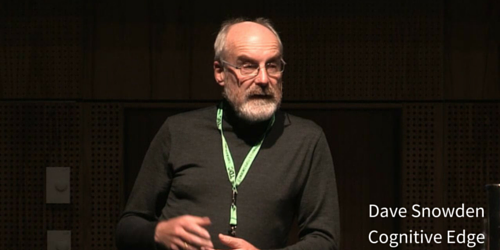A Different View on Knowledge Management - Dave Snowden

Dave Snowden is a well-known name in knowledge management circles.
Some know him as a passionate keynote speaker and some know him as the founder and chief scientific officer of Cognitive Edge. He is respected for his ideas, research and rebellious views when it comes to knowledge management. Why rebellious? Because he’s not afraid to go against the tide.

Some of you who are reading this interview may not know that we held successful workshops with Dave Snowden as one of the speakers and we value his opinion very much. And we are not the only ones
David Griffiths, David Gurteen and Dave Snowden with The TallyFox Team in Frankfurt, 9 October 2013
TallyFox: Let’s start from the beginning, tell us more about SenseMaker® and Cynefin, your widely-cited, award-winning framework for decision making.
Dave Snowden: Cynefin is a sense-making framework. It was first published in the context of knowledge management, in the article “Complex Acts of Knowing” which is the third most cited article in knowledge management at the moment. Cynefin brings complexity theory into play by saying that in the complex world you can’t take a purely information-centric view of knowledge. Too many KM solutions focus on aggregation and summarisation which only works for highly structured knowledge and information needs. We need to blend together material from multiple sources in real time to come up with novel solutions, so one thing SenseMaker® does is real-time knowledge management. We allow people to capture observations in the field as they come in, and recall them through the same mechanism that has captured them without any summarisation, synthesis, integration or structure etc, and it’s based on a principle called conceptual blending from cognitive psychology.
TallyFox: Is the KM world open to the way you operate?
Dave Snowden: They’re coming.
Companies are still repeating the same mistakes. I know one company, they’ve had three separate KM projects, each KM project has lasted for 5,6 years, and then it’s failed which resulted in people being fired. Those people then go out and set up a KM consultancy, and sell on the basis that has claimed past success. The reality is that they need to really go and look at it differently. Organisations go through a KM process believing in taxonomy and the communities of practice stuff, and when it all breaks down they try again and repeat the same mistakes. This needs to change.
TallyFox: What do they need to do differently? How would you help them?
Dave Snowden: I would not design and put a system in place, I would put in multiple free tools and see if people would use them.
The minute people start to design and build knowledge management systems I think they’re getting it wrong, that’s a secondary process. Agreed, everybody needs some sort of centralised file management system to store information which can then be searched, structured by text, and linked to - it’s all a basic hygiene factor, but that’s really information management. Knowledge management is more focused on tacit knowledge and on decision support which means the ability to assemble things in a novel way in real-time.
The really interesting thing is sensors or rather the Internet of Things, which is connecting things and people in ways we haven’t even imagined yet. This requires a different type of object-based architecture, and it requires people to interpret their experiences in real-time.
TallyFox: Where will this approach lead us?
Dave Snowden: This will lead us into true knowledge management. All we’ve been doing in the past 30 or 40 years is consistently failing and trying to replace knowledge with information and human communication with virtual interaction. There’s an old joke about this: “Will computers exceed human beings in intelligence in the next 15 years?” and the answer is “Yes, because at the moment we’re planning to meet them halfway”.
We’re reducing human communication to highly structured information screen-based centricity, which actually impoverishes it.
TallyFox: This way of thinking is very different to what we may hear at Knowledge Management conferences.
Dave Snowden: Knowledge management at the moment is influenced by IT people who are building solutions users don’t need. Instead of creating a knowledge sharing culture, we’re destroying it by the systems being put in place. Sharepoint is an example of that. It’s not dynamic and adaptive enough. Everything it does in terms of communities can be better done by social media.
I once got really angry at a conference and I tweeted that Sharepoint is to Knowledge Management what Six Sigma is to innovation and SAFe is to Agile.
TallyFox: Social media has influenced a change in behaviour with #tags, @mentions etc. Do these new communication patterns influence knowledge sharing?
They do as they create semi-structured search - #tags just emerge and then you find things. If I have a query these days, I post it on twitter. I’ve got a lot of Twitter followers and somebody will find a solution for me, so it’s fundamentally based on the ideas that you want to get these ad hoc, semi-structured search queries where you don’t know what you’re looking for, where the material is not pre-sorted or prepared, but it becomes available at the time of the query. Sensemaker goes a level on from that, it actually introduces higher-structure metadata which will work outside of social context.
I’m doing some work in Columbia at the moment, and I have to say, social media is the problem, not the solution. It’s a tyranny of the herds because it’s too easily gamed.

TallyFox: You said that IT departments are building solutions users don’t need. Do they know what they need?
Dave Snowden: No they don’t and if you ask direct questions on surveys you’ll get the wrong answers anyway. Generally, people don’t know what they need until they discover that there’s a better way of doing things and then they want something different, that’s been the history of IT over the last 40 years. Technology is developing so fast now, users don’t know how to ask for it. You need active interaction between what IT knows technology can do and what users haven’t yet learned to ask for. And that’s a different approach. It’s not push or pull, it’s a mixture of push and pull.
TallyFox: How would you handle the process of gathering information on what users need?
Dave Snowden: We’re enabling work on user requirements capture which is a continuous anecdotal capture of a representative sample of the workforce over extended periods of time, where we deal with unarticulated needs and frustrations. And when sufficient observations cluster we deliver small software pilots to actually deliver capability and see if it works. Knowledge management systems should reflect the way human beings have evolved to make decisions, not the way computers can be easily programmed.
TallyFox: What were the aha! moments in cognitive neuroscience in regards to knowledge sharing?
Dave Snowden: Let’s take a very simple example. People are constantly trying to give rewards for knowledge sharing, and all the available scientific evidence without any exception whatsoever says: “When people are working for explicit goals it destroys intrinsic motivation, and intrinsic motivation is fundamentally essential to knowledge sharing”. This is how KM practices contradict to natural science.
TallyFox: They could be trying to motivate experts to share.
Dave Snowden: Experts will always share their knowledge with people when they’ve got a real need, but the last thing they’ll do is codify it and put it in a database somewhere because somebody in the knowledge management function tells them to. The minute somebody asks: “How do we create a knowledge sharing culture?”, you know they’re in the wrong place.
TallyFox: But It doesn’t just happen. You need to nudge it a bit.
Dave Snowden: Yes, but it has to be pre-disposed to be nudged, which is something else we do. We map what the current attitudes towards IT and the systems are, and if they’re disposed to accept new things we put them in place, if not, we try and change that dispositional state, we don’t start with what we think people should do, we start with where people are and try and change that.
TallyFox: What would be your advice to the people reading this interview?
Dave Snowden: Start to allow technologies to interact with your people over time and allow actual use to emerge from that. Get a basic hygiene in place like a decent file management system and a proper data security and email communication. After that you need multiple small interactions and you need to see what’s sustainable and resilient to your organisation, it won’t be what somebody else has done that you hear about it at a conference. It will be unique to you, you can learn from other people but you can’t copy them.
Feel free to leave your feedback and questions for Dave in the comments.

Comments
Leave a comment